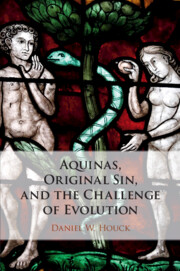Book contents
- Aquinas, Original Sin, and the Challenge of Evolution
- Aquinas, Original Sin, and the Challenge of Evolution
- Copyright page
- Dedication
- Contents
- Acknowledgments
- Introduction
- 1 Augustine and the Long Twelfth Century
- 2 Aquinas on Original Justice
- 3 Aquinas on the Effects of Original Sin
- 4 Aquinas on Original Guilt
- 5 Original Sin and Some Modern Theologians
- 6 Original Sin and the Challenge of Evolution
- 7 Original Sin
- 8 A Response to Some Objections
- Conclusion
- Select Bibliography
- Index
3 - Aquinas on the Effects of Original Sin
Published online by Cambridge University Press: 22 February 2020
- Aquinas, Original Sin, and the Challenge of Evolution
- Aquinas, Original Sin, and the Challenge of Evolution
- Copyright page
- Dedication
- Contents
- Acknowledgments
- Introduction
- 1 Augustine and the Long Twelfth Century
- 2 Aquinas on Original Justice
- 3 Aquinas on the Effects of Original Sin
- 4 Aquinas on Original Guilt
- 5 Original Sin and Some Modern Theologians
- 6 Original Sin and the Challenge of Evolution
- 7 Original Sin
- 8 A Response to Some Objections
- Conclusion
- Select Bibliography
- Index
Summary
Chapter 3 argues that Thomas radically reconfigures the relation between original sin and human nature. Whereas Augustine had argued that nature is “corrupted” by the Fall, Thomas draws on Denys the Areopagite to argue that strictly speaking, human nature survives the Fall. For Thomas, there are two senses of the word “nature.” In the strict sense, “nature” refers to the principia naturae and the propria that follow therefrom. The secondary sense of “nature” refers to what is good for nature – including communion with God. Thomas regularly uses Augustinian language concerning the corruption of nature by sin (e.g., STh I–II, q. 109), but when he explains this usage he indicates that it is improper (e.g., De malo q. 5, a. 2). Nature is “corrupted” only insofar as human beings have lost the good of nature, original justice. The principles and properties of human nature – including the orientation to God – remain. This is why Thomas argues that children who die unbaptized will know and love God in limbo.
Keywords
- Type
- Chapter
- Information
- Aquinas, Original Sin, and the Challenge of Evolution , pp. 88 - 117Publisher: Cambridge University PressPrint publication year: 2020



